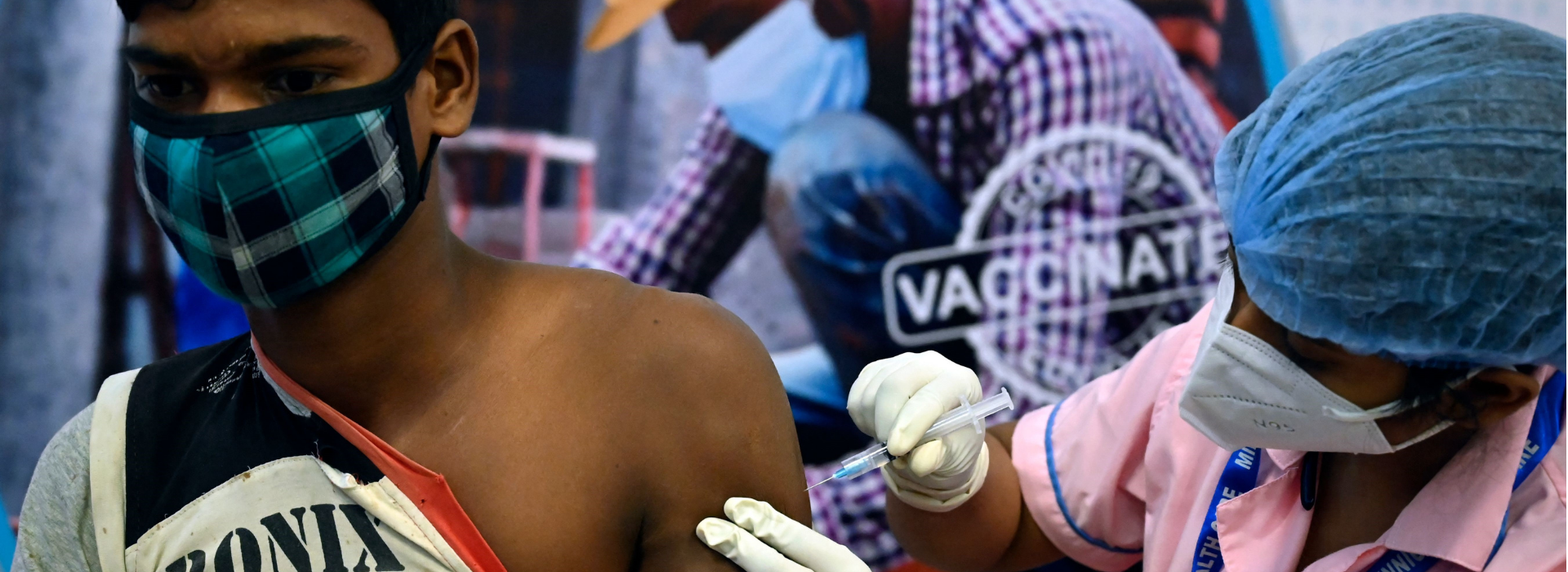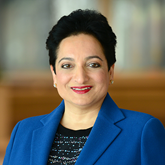
Vaccine equity is vital. India’s COVID crisis shows why
June 21, 2021 | By Shamina SinghThe devastating second wave of COVID-19 that has ravaged India activated first responders, front-line health care workers and philanthropic organizations to do all they could to help.
As the president of the Mastercard Center for Inclusive Growth, it’s been my job to mobilize the company’s global philanthropic response to the health and economic challenges that have unfolded in the wake of the pandemic. But for me, this latest crisis in India is very personal.
News of record-breaking infection rates, overcrowded hospitals and shortages of supplies broke just as many of us here in the U.S. were getting our first or second shots of the COVID-19 vaccine, returning to the office and planning our first “post-vax” trips. At Mastercard, the surge in cases hit especially close to home as our 4,000 Indian-based staff faced the unfolding situation with great concern for themselves, their families, colleagues and friends.
Shortly before case numbers rocketed, my recently vaccinated 87-year-old father flew to Delhi to work on his vocational education initiative, visit family and return my mother’s ashes to the place of her birth, fulfilling a promise we made before her passing just over one year ago. Soon after his arrival, cases began to spike and India’s hospitals started to run out of beds and oxygen.
Here at home, I was working with the Mastercard family around the clock to deploy $10 million in philanthropic funding to the country. Over personal texts and calls, my sisters and I grew increasingly concerned about our father’s safety and convinced him to come back to the U.S. The relief I felt at my father’s safe return was short-lived; it was heartbreaking to see India become a case study in what happens when vaccine inequity impacts a country of nearly 1.4 billion.
Official figures indicate that more than 388,000 people in India have died from COVID-19 but mounting evidence suggests that the actual death toll is far higher than officially reported. Despite being the world's biggest producer of vaccines, just 3.6% of the population is fully vaccinated as of today. Vaccine supply chain bottlenecks and an overwhelmed health care system mean India is struggling to ensure it has enough vaccines for its most vulnerable citizens.
And yet, India is not alone in falling behind on vaccines. According to the World Health Organization, almost 1 in 4 people have been vaccinated against COVID-19 in wealthy nations but less than 1 in 500 in low-income countries. Patchy vaccine access also creates the risk of new variants evolving and potentially spreading — a scenario that would prolong the pandemic and affect a greater number of people.
All of this has brought into stark relief the urgent need to ramp up efforts to ensure vaccines are made available to the world’s most marginalized populations. Sharing resources to ensure equal vaccine access is not about being charitable; it’s about making sure everyone, everywhere can thrive and prosper. In our interconnected world, there is an enormous economic cost to vaccine inequity.
Gavi, the Vaccine Alliance estimates that the world’s most advanced economies would incur half of the $4 trillion cost that could come from a failure to vaccinate most people in low-income countries. Vaccine access is a critical issue not only in India but most regions around the world. And that’s why we applaud The Mastercard Foundation’s recent $1.3 billion commitment to curb the spread of COVID-19 in Africa by enabling millions of people across the continent to receive access to lifesaving vaccines.
We recognized early on the need to ensure equitable access to vaccines and therapeutics for hard-to-reach communities. And that’s why we partnered with The Gates Foundation and Wellcome and committed up to $25 million to establish the COVID-19 Therapeutics Accelerator. We’ve also committed $25 million to Gavi to help them administer the COVAX program. That effort aims to deliver 2 billion COVID vaccines by the end of 2021, with half of those going to low-income countries to protect front-line workers, as well as vulnerable and high-risk people.
Our philanthropic commitment in India is providing for 2,000 much-needed hospital beds and funding 1,000 oxygen generators to provide essential supplies. And we’re covering vaccine costs, holding vaccination drives and increasing support payments for our staff who have worked from home as the pandemic grips their country.
India’s COVID crisis may have peaked, but it is far from over and I’m still deeply concerned about the health and welfare of our staff there and my extended family around the country. Some of my relatives have already been vaccinated in Delhi. It’s a different story for the family in rural parts of India’s northern Punjab state, where vaccines are much harder to find.
For me, I won’t be able to rest until we’ve exhausted our collective efforts to ensure everyone around the world has access to vaccines and therapeutics. Doing well by doing good is what has sustained me professionally and personally this past year. The crisis in India has brought into stark relief how interconnected all our lives are; the pandemic will continue to be a threat to all of us as long as it exists anywhere in the world.
Top banner: A health worker inoculates a construction worker with a dose of the Covaxin vaccine at a shopping mall in Kolkata on June 16. (Photo credit: Dibyangshu Sarkar/AFP via Getty Images)
